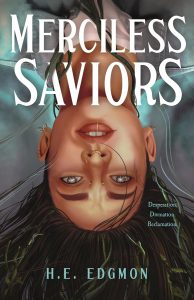Merciless Saviors by H.E. Edgmon: Review by Colleen Mondor
 Merciless Saviors, H.E. Edgmon (Wednesday 978-1-250-85363-9, $20.00, 336pp, hc) April 2024.
Merciless Saviors, H.E. Edgmon (Wednesday 978-1-250-85363-9, $20.00, 336pp, hc) April 2024.
In Godly Heathens, the first book in H.E. Edgmon’s duology about American teens who are actually gods from a parallel world, readers met Gem Echols from small-town Georgia, who suffers from truly horrific dreams. Gem’s best friend is Enzo, a Brooklyn teen with whom they share a long-distance (never met in person but plenty of texting, talking and facetiming) friendship that is well on its way to romance. Meanwhile, there’s Gem’s father, who is not part of their life and may have an unspecified mental illness, and a hard-working mother whose brusqueness prevents a close relationship. At school, Gem has classmates to flirt and hook up with, occasionally share a lunch with, and overall get along fine with. Then Willa Mae Hardy sits down, imparts a bizarre story (about gods from a parallel world), and Gem’s world is turned upside down. Godly Heathens primarily concerned itself with the fallout from Willa’s sudden arrival into Gem’s life, and her subsequent impact on several other local teens. Suffice to say, nothing about Gem’s life was as it seemed. The book included some shocking twists and a huge cliffhanger ending. The sequel, Merciless Saviors, was released earlier this year and while it ties up the first book’s many questions, it may leave readers wishing the characters remained in Georgia.
The necessity to skirt spoilers for Godly Heathens makes reviewing Merciless Saviors alone somewhat problematic. So, I will address both books and focus on Edgmon’s outstanding set of characters who, more than the magic and the complex plot, are what make the duology so memorable. Gem, Enzo, and Willa (later addressed as Rory) form a solid friend set, while the sort-of obvious but not villains Poppy and Marian have a relationship that is all kinds of complicated while also extremely compelling. There is an outer ring of supporting characters who appear throughout the story (some just sticking around long enough to die spectacularly) who interact with the main group in significant ways. As teenagers, and gods, their distinct personalities shine through and the old hurts, new dramas, and recurrent annoyances they share are all surprisingly relatable. As Edgmon shows, often in humorous ways, even gods get frustrated with each other, and any teen reader will understand that.
Godly Heathens is set almost entirely in Georgia, but in Merciless Saviors the cast is moved to their original home, ‘‘The Ether.’’ Portrayed as a world very similar to our own, it feels flat on the page and once returned there, the characters, especially Gem, are reduced to petty disagreements and godly pronouncements, and they spend a lot more time talking about themselves than working through their differences. After the big reveals of the first book, I found little to sort out in the second and with the primary villain killed (far too quickly in my opinion), everyone else is just left to find their ways to the inevitable resolution. I would have liked to see Gem’s Indigenous connection to Georgia, something they mention several times, be more fully explored. For all its magic, at least to me, The Ether just does not have as much to offer as the American South, a place with a singular appeal that Gem in particular is drawn to.
The gods and monsters (including those of the humankind) that fill the pages of Godly Heathens and Merciless Saviors can be intense, and Edgmon’s content warnings should not be ignored. (There is a scene in the second book that is not for the squeamish. At all. Trust me.) Finally, I do want to give a shout out to the duology’s ending which is, bar none, made of some of the most satisfying paragraphs I have read in years. While the second book is not as strong as the first, the travails of Gem and the other characters will keep readers riveted. Edgmon might return to these characters again in the future (there is plenty of room to that) and with so many potential stories to plumb here, I imagine his fans would be happy to see more.
Interested in this title? Your purchase through the links below brings us a small amount of affiliate income and helps us keep doing all the reviews you love to read!
This review and more like it in the September 2024 issue of Locus.
 While you are here, please take a moment to support Locus with a one-time or recurring donation. We rely on reader donations to keep the magazine and site going, and would like to keep the site paywall free, but WE NEED YOUR FINANCIAL SUPPORT to continue quality coverage of the science fiction and fantasy field.
While you are here, please take a moment to support Locus with a one-time or recurring donation. We rely on reader donations to keep the magazine and site going, and would like to keep the site paywall free, but WE NEED YOUR FINANCIAL SUPPORT to continue quality coverage of the science fiction and fantasy field.
©Locus Magazine. Copyrighted material may not be republished without permission of LSFF.









